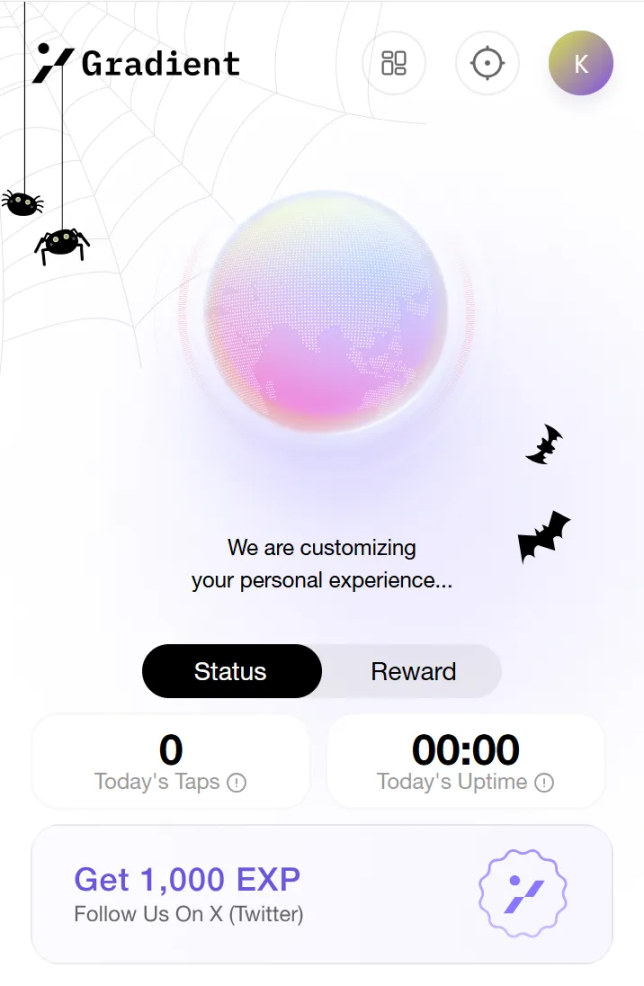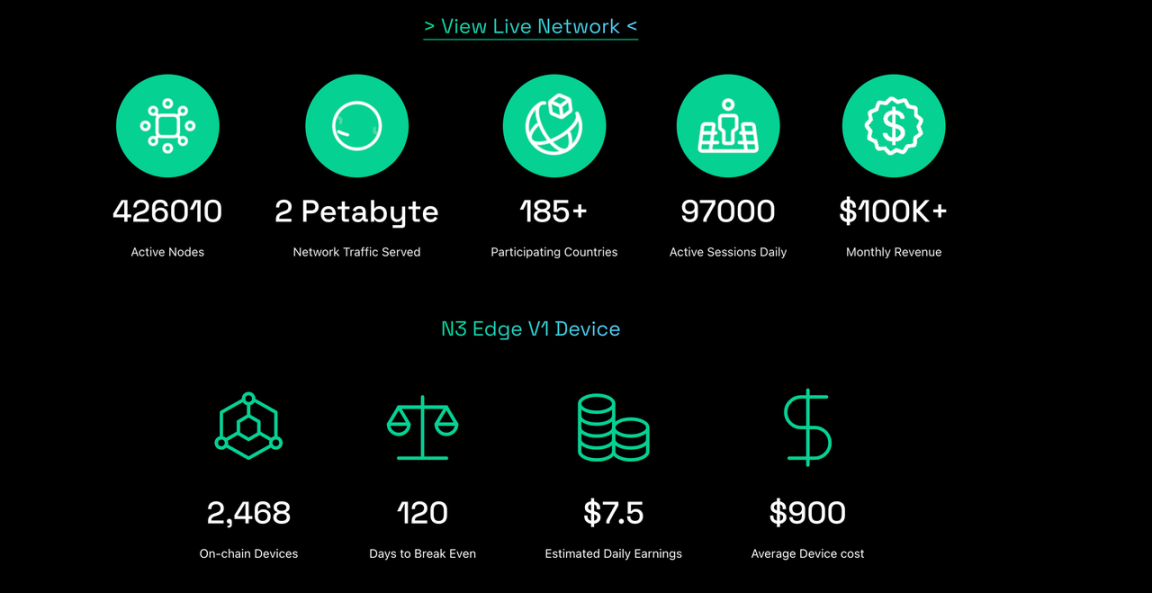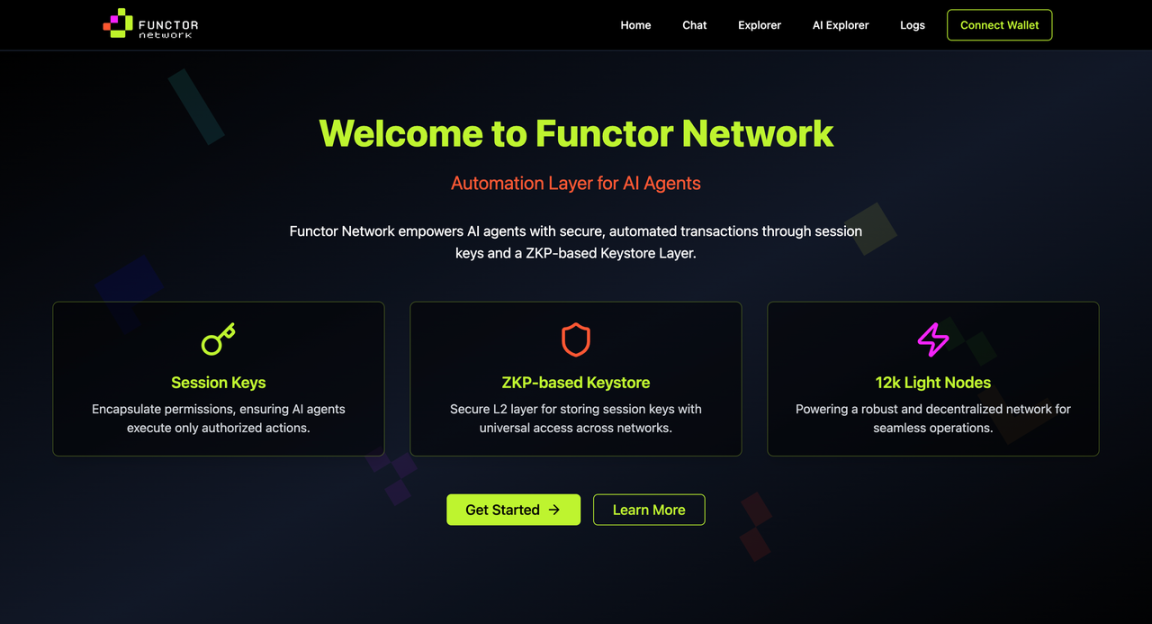Be the first to interact, an article to review the DePIN zero-cost projects
Originalautor: shaofaye 123, Foresight News
Recently, Grass was launched on Binance, which caused a wave of enthusiasm. Solana DePin leader IO also saw a significant rebound. Research institution Messari estimates that the total TAM of the DePIN track will exceed 2.2 trillion US dollars and will reach 3.5 trillion US dollars in 2028. Major institutions have made plans, and various DePIN projects are gradually growing with the help of AI narrative.
In addition to Grass, what other DePIN projects are worth paying attention to, and how to participate in the early stage? This article will take you through the DePIN projects that can be idle and free, and get early airdrops.
Five-star attention
DAWN
DAWN is a decentralized autonomous wireless network project developed by the Andrena team. The Andrena project entered RD as early as 2014, but at that time its main research area was focused on mobile data sharing in Web2. Its founder Chatterjee graduated from Princeton University, and another member, Pramod Viswanath, has a stronger academic background than Chatterjees legendary entrepreneurial experience. Pramod Viswanath is a professor at Princeton University and a core member of another popular encrypted AI project, Sentient.
DAWN mainly breaks the traditional model that Internet bandwidth is managed and allocated by large Internet service providers (ISPs), and consumers have no say in its allocation or pricing. It turns bandwidth into a commodity that every user can manage, use or sell. DAWN has currently received $18 million in financing, led by Dragonfly, with participation from CMT Digital, Castle Island Ventures, Wintermute Ventures, 6th Man Ventures and ParaFi. Solana also reprinted and promoted it on X. According to the official white paper, the proportion of airdrops given to users currently accounts for about 32% of the total tokens, of which software participants account for 7%.
DAWN is operated by combining software and hardware. The project is still in its early stages and RAS hardware is not yet popular. The current way to participate is very simple. You can download the browser plug-in (https://www.dawninternet.com/blog-posts/dawn-validator-extension-rewards-system) to act as a verification node to obtain early point rewards. After completing the social tasks, you can also get 15,000 points reward.
Gradient Network
Gradient Network is an open layer for edge computing on Solana, aiming to make computing inclusive, accessible and affordable for everyone. Like DAWN, it belongs to the IP mining category. It has received investments from Multicoin Capital, Pantera Capital and Sequoia Capital. It has launched its initial product, GradientSentry, and has entered the public beta stage.
The registration process is similar to DAWN, enter your email address or log in directly through Google. Download the plug-in and hang up to automatically earn points, or you can increase your points by inviting friends.
Rivalz Network
Rivalz Network is an AI-driven DePin RollApp, the first player-to-AI network built on Dymension and powered by Celestia Labs. Rivalz Network is primarily used for personal data provenance, it provides a data source for verifiable personal, credential and behavioral data, with privacy and intellectual property embedded.
Currently, the project has received US$9 million in financing, with major investors including Delphi Ventures, D 1 Ventures, Gate.io, Magnus Capital and Cogitent Ventures; other supporters include DWF Labs, Mask, GSR, etc.
Rivalz Network currently supports mining on Windows, MAC, and Linux clients. You can also earn RIZ tokens through social tasks and mining. The airdrop share of purchasing nodes will be larger, accounting for about 25% of the total token issuance. The official current minimum configuration requirements are: 8 GB RAM, CPU 4 cores (2.2 GHz), disk 50GB SSD, network speed 10 Mbps.
Nodepay
The Nodepay project belongs to AI infrastructure and is a decentralized AI training network. Nodepay can provide decentralized bandwidth network infrastructure for AI training. By connecting to the Nodepay network, users will be able to sell unused Internet to AI companies, thereby achieving efficient transmission of public training data, labels, model sharing, and remote distributed training.
Nodepay has completed a round of financing in October this year. The amount of financing has not been disclosed. Investors include Animoca Brands, Jump Crypto, Elevate Ventures, OKX Blockdream, Mirana Ventures, NGC Ventures, etc. On November 12, Nodepay announced that it will airdrop to users with the Proof of Humanhood badge. Recently, Nodepay mobile terminal has also performed well in the app store, with high activity, and entered the top 200 of the app store.
The way to participate is similar to the above-mentioned projects. You can also download the plug-in and hang up to earn points.
Nexus Network
Nexus Network is a massively parallelized proof-of-stake mining network that is a decentralized cloud computing network. It is a world-class instantiation of the Nexus zkVM, designed to run at a trillion CPU cycles per second. Nexus zkVM (zero-knowledge virtual machine), currently in phase 1.0, is a modular, scalable, open source, highly parallelized, verification-optimized, contributor-friendly zkVM written in Rust with a focus on high performance and security.
Nexus has completed two rounds of financing, with a total amount of US$27.2 million. In June this year, Nexus completed a US$25 million Series A financing, led by Pantera and LightSpeed, with participation from Dragonfly Capital, Faction Ventures and Blockchain Builders Fund.
Currently, the initial Beta version of Nexus Network is online. It is a distributed validator network based on a zero-knowledge virtual machine that can be accessed by anyone. Nexus hopes to unlock a verifiable Internet by uniting computers around the world to form a single supercomputer.
You can participate by entering its Beta test network and clicking Connect. It should be noted that the wallet has not been bound yet, and clearing the browser cache may cause the points to be cleared.
Other Inventory
Network 3
Network 3 is a decentralized AI infrastructure where users can provide inference, fine-tuning and training services for edge AI models by sharing bandwidth, computing power, data sets, etc., thereby obtaining token points incentives. Network 3 currently supports client mining for all systems including MAC, Windows, Android, IOS, and Linux.
It has completed a financing of US$5.5 million, with participation from Waterdrop Capital and IoTex. The first round of pre-sales of mining machines was launched in August, and it is estimated that the first batch of mining machines will pay back in 120 days.
Uplink
Uplink is a decentralized physical infrastructure network that mainly provides decentralized network connections and aims to create better distributed and user-operated infrastructure. Users can become providers and install hardware compatible with Uplink for use in their own communities or business premises, and profit directly from its use. Its business model is similar to DAWN. It has raised $10 million in funding, led by Framework, with participation from Blockchange, Outlier, NxGen, Stratos, etc. In addition, the project has previously cooperated with Ericsson, Deutsche Telekom, and E.ON. The mining client is not yet online, and points can only be earned by completing social tasks.
BlockMesh Network
BlockMesh is a decentralized bandwidth network project. It allows users to tokenize excess bandwidth, providing users with opportunities to passively profit and participate in the AI data layer, online privacy, open source, and blockchain industries. The project also won the first place in the hackathon DePIN track and reached a cooperation with the exchange BackPack.
PinGo
PinGo is an AI and DePIN project on the TON network. Its purpose is to solve the problem of fragmentation and idleness of idle computing resources and provide a computing power foundation for building AI models. PinGo was originally a Cpin Web2 company with nearly 100,000 devices, which will be integrated into its own DePin network in the future. As one of the few DePIN projects in the TON ecosystem, it has completed its seed round of financing in October, with participation from CGV, CatcherVC, T-Fund, K 24, LandScape, etc. Currently, it only supports Android and Linux systems.
Oasis AI
Oasis AI is an AI inference project. It is a GPU computing power sharing mining project designed to meet the huge demand for open source model inference. Oasis connects AI model users and computing resource providers through browser extensions. Users can access and run open source AI models such as chat assistants, image generators, and speech-to-text for free. At the same time, computing resource providers can also earn tokens by sharing GPU or CPU resources. Currently, it supports Windows, MAC, Linux and other systems, and you can earn OAI tokens by hanging up.
Functor Network
Functor Network is the autonomous layer of AI agents. Functor Network can automatically perform complex and data-intensive tasks, aiming to build a world safely assisted by AI agents. The team members are technically strong, the CEO has won 8 hackathon awards, and is one of the founding members of HER DAO. The project is still in its early stages, and you can mine by downloading the plug-in and registering to receive 200 FUNC.
Teneo
Teneo is a DePIN IP mining project. It seems to be from the same team as the previous Eloop One project. The team members are mainly from Europe, the network is operated in Vienna, Austria, and the investment and financing background is unknown. Register to get 2500 points. Download the plug-in to hang up.
This article is sourced from the internet: Be the first to interact, an article to review the DePIN zero-cost projects
Following EigenLayer, another heavyweight player in the staking track is about to issue coins. Mantles liquidity staking/re-staking protocol mETH Protocol has recently announced on its official social media many times that its governance token will be released soon. According to the clues currently available to Odaily Planet Daily, the token is expected to officially conduct TGE at the end of October, when about 15% of COOK may enter circulation. mETH Protocol business breakdown: spanning the two tracks of staking/re-staking The birth of mETH Protocol can be traced back to August 2023, when mETH Protocol was positioned as a decentralized, permissionless liquidity staking protocol , intended to serve as Mantles second core product after the Layer 2 network, and to work together with the entire Mantle ecosystem to create…














